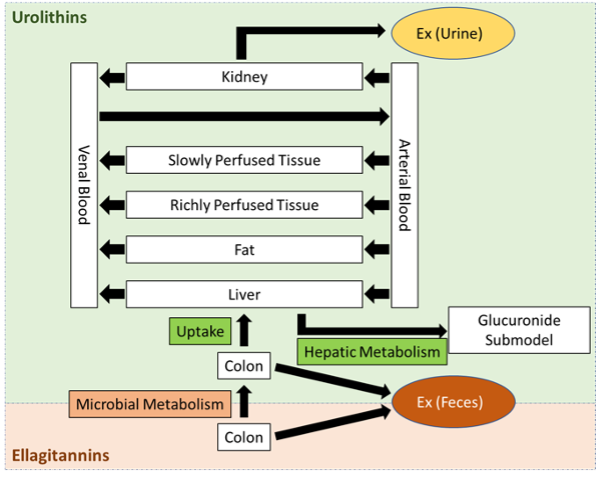Urolithins: A bioinformatics / personalized nutrition approach to enlighten kinetics of beneficial gut microbial products (UroKin)
Ellagitannins are naturally occurring food constituents predominantly found in walnuts and pomegranates. Extensive scientific data link them with preventive effects against cancer, aging, and neurodegenerative diseases. The UroKin project targets several remaining obstacles in promoting the application of ellagitannins in functional foods. The high inter-individual differences in pharmacokinetics as well as the largely unknown connection between gut microbiome composition and the quality and quantity of urolithin formation are explored by using combined in vitro / in silico approaches.
Gut-competent PBPK modelling, a new approach methodology to reduce animal testing, is used to predict systemic urolithin levels from ellagitannin consumption doses. Metagenomic data analysis identifies the relevant microbes involved in urolithin formation, and complete in vitro gastrointestinal modelling explores whether the growth of these bacteria can be promoted by intake of ellagitannins or similar compounds. Finally, metagenomic data is used to find population groups by age, lifestyle, sex, or health predicted to possess extraordinary capacities to produce urolithins. Kinetic parameters of the PBPK model can be adjusted with these findings to facilitate a comparative analysis of urolithin bioavailability depending on extrinsic factors. This will result in detailed knowledge about populations for which ellagitannins are effective functional foods, guiding product design for personalized nutrition.
UroKin is led by external page Dr. Georg Aichinger, a postdoctoral fellow of the Future Food Initiative, a program of the World Food System Center of ETH Zurich, the external page Integrative Food and Nutrition Center of EPFL, and industry partners.
Collaboration and Funding Partners

Main Contacts
Georg Aichinger
